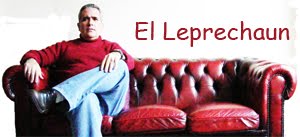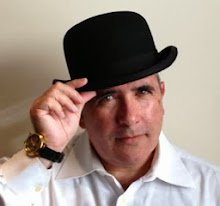A few days before the World Fantasy Convention
started last year in Brighton (in U.K.) the people of the bookshop Forbidden
Planet in London had the brilliant idea of bringing together the original
creators of the Steampunk genre: K. W. Jeter, James P. Blaylock and Tim Power.
I was lucky enough to be there, before and
after the signing, sharing an ale in a traditional British pub with these
notable writers. They are amazing, friendly, and K.W and his wife Geri are
lovely people; always willing to answer questions from fans and even meet the
strangest requests (a guy came with a big suitcase of old books for him to
autograph).
After the fans and the journalists were
gone, between drinking beers, we broke the ice and started to talk about how
the Steampunk literature is gradually taking a place in Sci-Fi. Not as the little brother, but treated as an equal, winning readers every day, creating challenges in a multicultural and multiverse society,
over the Victorian aesthetic.
For K.W. it's definitely the immediate
future, not only because it is not an exclusively Anglo-Saxon literature
anymore, but by the very nature of the world - we live in a global society,
where everything is connected. Social Networks are everywhere, instant
messaging services, mobile communications and live chats are breaking borders,
the only limits now are for political reasons. He has a much better insight
than you might think, perhaps because of the fact that he has been living in
Ecuador for a while and from South America everything has a different
perspective, or maybe, as he said, because he has lived American history from
the time of the Eisenhower administration to Obama and has seen the world changing in front
of his eyes and nothing is what
it used to be.
I agree completely with him regarding the world and how it is increasingly interconnected and multicultural Steampunk
is the next natural stage of the
subgenre - and this extends not only to
literature but also to fashion,
art, and music. The Steampunk of the future will be something heterogeneous, that mixes influences and aspects of
countries and languages, with
fewer rules and more
imagination, and will link
communities around the world making it
part of the universal culture
of humanity. You already can see groups from France to India,
sharing the most amazing diversity, adapting Steampunk to the local history,
perspective and creating events and conventions.
Finally, take me as a life sample of
multicultural Steampunk: I was born in Caracas, Venezuela. My parents were Spaniards but my aunt and
uncle were Americans because my grandparents had immigrated to New York in the
20s. I come from a rather diverse family. I'm married to a Mexican woman. I
have been living in London for seven years. I write only in Spanish. With this
background, how do you think my Steampunk literature style could be?
Spain, Dlorean Ediciones 2013
El Dirigible (The Airship) by
Joseph Remesar
London, 1876.
It's winter in the capital of the British Empire. James Usera-Blackpool is a
Scotland Yard Inspector with few ambitions, mostly due to his lack of partisan
activity. However, it will all change in his next case: the murder of an
unknown American citizen at a party in the Spanish Embassy. A steampunk novel
that combines police thriller with the classic Science Fiction tradition of
H.G. Wells and Jules Verne. -




No hay comentarios.:
Publicar un comentario